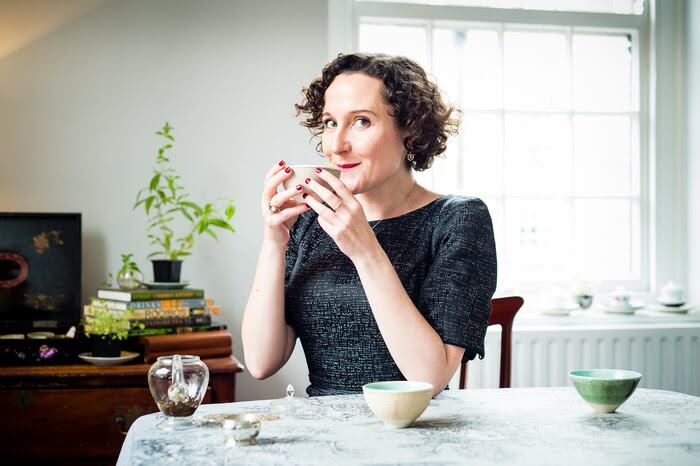Rare Tea’s mission is simple: to turn people away from ‘cheap, industrial tea’ towards ‘exquisite tasting, handcrafted teas of the finest quality’. The British company has also pioneered a proud ethos of working directly with its farmers in Africa and India since 2004, choosing not to buy from brokers, middle-men or commodity markets.
Rare Tea pays its farmers what it calls a ‘sustainable and better’ price for their handcrafted tea. It no longer works with the Fairtrade certification organisation, choosing instead to work directly with its farms. It returns a percentage of its revenue to its Rare Charity, which supports educational scholarships on its farms in Africa.
These two principles of flavour and ethics go hand in hand. “If it didn’t taste good, customers would only buy it once,” observed Lovell. “And once you've tried it, there's no going back.”
She boasts a throng of loyal customers mainly made up of, perhaps surprisingly, students in the 18-30 age group. This observation is borne out by data from a recent trends report from UK 'communi-tea' National Tea Day that concluded the biggest growing consumer demographic in tea is 24- to 35-year-olds.
"They want to find out deeply about the tea,” she said. “Our website stats tell us they go deep into the product pages. They want to see the pictures. They want to look at our Instagram and to see that we really do direct source. They read about the charity. It is extraordinary. They want to know all the geeky details about how to make the tea. They'll spend hours online in a way we wouldn’t have imaged when we first built the website back in 2004.”
Can students really afford fine tea? "It’s a few pennies more per cup,” said Lovell. “It's not like buying premium wine. It’s an affordable luxury.”
When Lovell quit the cutthroat world of corporate finance to launch Rare Tea, she was warned that her direct sourcing approach wouldn’t be scaleable. But what proved this theory wrong was the increased demand from consumers for this way of doing things.
"It was never a problem with supply… the scaleability is the demand,” she pointed out. “The problem is not the lack of tea; the problem is demand for value tea. And we've seen the creation and development over the years of people valuing and wanting something better and turning away from cheap industrial tea.”
There are various reasons why younger consumers have led this shift in demand. "Young people are much more connected to the world and once their eyes are open to one thing then they are open to everything,” according to Lovell. This group wants to ensure that the coffee, chocolate and tea they buy can have a positive effect on “marginalised rural communities in parts of the world that are not flourishing”.
Rare Tea’s products have also been championed by taste makers, chefs and influential restaurant critics such as Jay Rayner. This fact again connects with younger cohorts. “Young people like to spend a lot of their money on experiences, rather than goods. They may never be able to afford a flat, but they can afford to instead go a beautiful restaurant.”

‘It’s not posh tea’
But Rare Tea Company is not without its challenges. While the 18-30 cohort makes up 65% of the business, she admits that, in the UK at least, the premiumisation of tea is still waiting to fully happen.
"We know the difference between instant coffee and a beautiful coffee bean; we know the difference between vegetable oil and cold pressed olive oil. But in tea we’ve kind of forgotten the value proposition, which is crazy because we love tea. But we drink mass produced industrial tea of the lowest grade.”
Tea farmers are, however, as skilful as sommeliers, she contends. The company’s Silver Tip Jasmine White Tea, for example, is scented with fresh flowers every night for six nights. “Every night the flowers are removed and every morning fresh flowers are supplied. That’s an extraordinary amount of manpower, craftsmanship and raw material.”
But UK drinkers are too used to drinking ‘bland and boring’ tea. "It’s because tea is something that we are so emotionally attached to… Young people don't have that long-held emotional attachment.
“What upsets me is when people accuse me of selling posh tea - you wouldn't say that about wine or cheese. I don't really understand why people in Britain are a little afraid of trading up.”
One theory is the tea rationing during the second world war. “Before then, we used to spend more on our tea than alcohol.” A return to a similar attitude is not ‘outlandish’, she believes. “This is our history - we are famous for tea and we created these amazing things like English Breakfasts which were these extraordinary combinations of tea from around the world. I'd love to bring that tradition back, along with that value back to the farmers so they may thrive like vineyards.”
'Brands need to stand for something these days'
A company has to make money but not at the expense of everything, concluded Lovell. “I haven’t changed my principles, but people have moved towards my way of doing things over the years hopefully.
"You don't have sharp elbows to be successful. You can make a successful business by being responsible, ethical, by thinking about things other than profit - and that can be profitable, especially in today's age where people do care about stuff. My parents’ generation cared about big brands and trusted in them. And I think that trust has been eroded and people care about brands that stand for something.”


